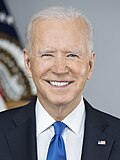March 5, 2024 | |||||||||||||||||||
11 delegates (6 pledged and 5 unpledged) to the Democratic National Convention | |||||||||||||||||||
|---|---|---|---|---|---|---|---|---|---|---|---|---|---|---|---|---|---|---|---|
| Turnout | 0.6% (registered voters) [1] | ||||||||||||||||||
| |||||||||||||||||||
| Elections in American Samoa |
|---|
 |
The 2024 American Samoa Democratic presidential caucuses were held on March 5, 2024, as part of the Democratic Party primaries for the 2024 presidential election. Eleven delegates to the 2024 Democratic National Convention were allocated to presidential candidates. [2] The contest was held on Super Tuesday alongside primaries in 14 other states and territories.
Contents
Biden unexpectedly lost the popular vote to lesser-known candidate Jason Palmer, [3] making Biden the first incumbent president to lose a contested presidential primary since Jimmy Carter lost 13 primaries to Ted Kennedy in 1980. [4] Palmer had three campaign staffers on the island and held several virtual events prior to the caucuses. A Biden campaign official dismissed the loss as "silly news." [5] It was initially reported by the American Samoa Democratic Party that Palmer won four delegates, while Joe Biden won two. The same day, the delegate count was corrected, with Palmer and Biden winning three delegates each. [6]
Biden's loss in American Samoa makes it the only state or territory primary he never won in all four of his presidential and vice presidential bids. [7]

